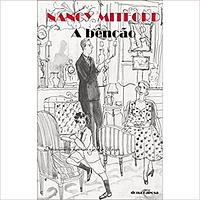Take a photo of a barcode or cover
"She told me, at luncheon, that she has hardly been out in society since the war, but she spent all those years looking after goats. Of course the English are very eccentric...you have never crossed the Channel, but you can take it from me that they are all half mad, a country of enormous, fair, mad, atheists. Why did she look after goats? We shall never know. But looking after goats can hardly be considered as a good preparation for life with Charles-Edouard."
I selected The Blessing by Nancy Mitford via random draw from my TBR list, which was pretty great timing. Nancy Mitford is a fabulous way to begin the new year. Grace Allingham, a naïve English heiress, impulsively marries the older French nobleman, Charles-Edouard de Valhubert. The two barely know one another and spend the first seven years of their marriage apart because of the war. Once the war is over, Grace and Charles-Edouard make their way to France with their young son, Sigismund. Charles-Edouard cannot resist falling back into his old, woman-chasing ways, while Grace experiences a bit of a culture shock.
I really enjoyed the plot of The Blessing. Per the introduction, this is Nancy Mitford’s “most personal” work and the relationship between Grace and Charles-Edouard mirrors that of her relationship with Gaston Palewski. I definitely got swept away in that, and although the blurb made it seem as if this book would be more about Sigismund and his antics, I really thought this was was a book about Grace and her acceptance of the circumstances governing her marriage. I also like the way that Mitford pokes fun at the hypocrisy of English traditionalism (at least in terms of marriage and adultery.) I really enjoyed the scenes with Sigi, they definitely contributed to the overall humor of the novel and I found it rather impossible not to be charmed by his troublemaking (the scenes with the burglar were hilarious!)
I really enjoyed The Blessing. I would rank it lower than The Pursuit of Love and Love in a Cold Climate, but higher than Wigs on the Green or Don’t Tell Alfred. It definitely has that signature charm and is brimming with humor. Also is this Mitford’s gayest book? Nancy Mitford was certainly a bit of a “fag hag” (her father railed against her effeminate friends, she was engaged to a homosexual, and was a dear friend of Evelyn Waugh. There are so many wonderful little quotes about gay men and purported lesbians in this book:
"But, poor old things, they're not sick...they just happen to like boys better than girls. You can't blame them for that, it's awfully inconvenient, and they'd give anything to be different. But I don't see that it's any reason to call them Bolshevists. I probably know more about them than you do, having been at Eton and Oxford, and if there's one thing they're not it's Bolshevists."
funny
lighthearted
medium-paced
Plot or Character Driven:
A mix
Strong character development:
No
Loveable characters:
Yes
Diverse cast of characters:
No
Flaws of characters a main focus:
Yes
emotional
funny
lighthearted
fast-paced
Read for the Mini Magical Readathon: Visit Hogsmeade! Prompt - Zonko's Joke Shop: A humorous read.
funny
reflective
medium-paced
Plot or Character Driven:
Character
Strong character development:
Yes
Loveable characters:
Yes
Diverse cast of characters:
No
Flaws of characters a main focus:
Yes
funny
informative
lighthearted
reflective
medium-paced
Plot or Character Driven:
A mix
Strong character development:
Complicated
Loveable characters:
Complicated
Flaws of characters a main focus:
Yes
Brilliant!! Very funny. I don't usually read this kind of period piece but I will need to read more of hers!
More snark from Nancy Mitford.
Quotable:
"I wish I understood Americans," said Charles-Edouard. "They are very strange. So good, and yet so dull. "
"What makes you think they are so good?"
"You can see it, shining in their eyes."
"That's not goodness, that's contact lenses--a kind of spectacle they wear next to the eyeball. I had an American lover after the liberation and I used to tap his eye with my nail file."
Quotable:
"I wish I understood Americans," said Charles-Edouard. "They are very strange. So good, and yet so dull. "
"What makes you think they are so good?"
"You can see it, shining in their eyes."
"That's not goodness, that's contact lenses--a kind of spectacle they wear next to the eyeball. I had an American lover after the liberation and I used to tap his eye with my nail file."
Hmm...
As WW2 is beginning, Grace receives a visit from Charles-Edouard, an aristocratic French friend of her fiancé, Hugh. Within a month, poor Hugh has been dumped, Charles-Edouard and Grace have married and C-E has gone off to war. Finding herself pregnant, Grace goes off to live in her father’s country house, and waits seven long years for C-E to return. When he does, he promptly whisks Grace and the child, Sigi, off to France, where he divides his time between his wife and his mistresses. Eventually Grace leaves him, and the big question is will they get back together? Sigi is enjoying having two parents vying to spoil him most, so he sets out to do everything he can to keep them apart…
Pretending to be a satire, it’s actually a nice little fluffy romance of the type where the man is a worthless, faithless leftover from a dying breed, and the woman is a bucolic, intellectually-challenged leftover from another dying breed. Hmm… I’m struggling to think of anything to say about it, really. Not my kind of thing, as it turns out. The “insights” into French society feel about as realistic as Wodehouse’s England, but unfortunately the book lacks either the humour or good-natured charm of his work. I think it’s supposed to be funny though…
I skipped the last 40 pages because, you know, who cares if they get back together?
www.fictionfanblog.wordpress.com
As WW2 is beginning, Grace receives a visit from Charles-Edouard, an aristocratic French friend of her fiancé, Hugh. Within a month, poor Hugh has been dumped, Charles-Edouard and Grace have married and C-E has gone off to war. Finding herself pregnant, Grace goes off to live in her father’s country house, and waits seven long years for C-E to return. When he does, he promptly whisks Grace and the child, Sigi, off to France, where he divides his time between his wife and his mistresses. Eventually Grace leaves him, and the big question is will they get back together? Sigi is enjoying having two parents vying to spoil him most, so he sets out to do everything he can to keep them apart…
Pretending to be a satire, it’s actually a nice little fluffy romance of the type where the man is a worthless, faithless leftover from a dying breed, and the woman is a bucolic, intellectually-challenged leftover from another dying breed. Hmm… I’m struggling to think of anything to say about it, really. Not my kind of thing, as it turns out. The “insights” into French society feel about as realistic as Wodehouse’s England, but unfortunately the book lacks either the humour or good-natured charm of his work. I think it’s supposed to be funny though…
I skipped the last 40 pages because, you know, who cares if they get back together?
www.fictionfanblog.wordpress.com
Prefer The Pursuit Of Love and Love in a Cold Cliimate. Not bad, though, by any means.



